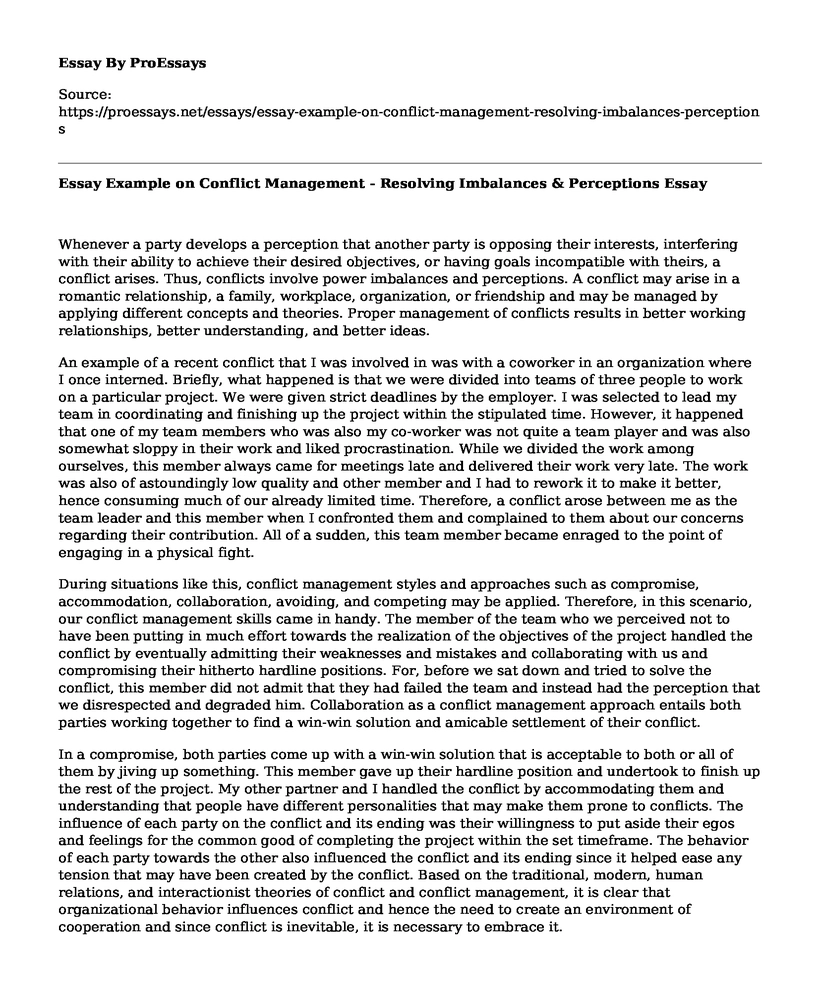Whenever a party develops a perception that another party is opposing their interests, interfering with their ability to achieve their desired objectives, or having goals incompatible with theirs, a conflict arises. Thus, conflicts involve power imbalances and perceptions. A conflict may arise in a romantic relationship, a family, workplace, organization, or friendship and may be managed by applying different concepts and theories. Proper management of conflicts results in better working relationships, better understanding, and better ideas.
An example of a recent conflict that I was involved in was with a coworker in an organization where I once interned. Briefly, what happened is that we were divided into teams of three people to work on a particular project. We were given strict deadlines by the employer. I was selected to lead my team in coordinating and finishing up the project within the stipulated time. However, it happened that one of my team members who was also my co-worker was not quite a team player and was also somewhat sloppy in their work and liked procrastination. While we divided the work among ourselves, this member always came for meetings late and delivered their work very late. The work was also of astoundingly low quality and other member and I had to rework it to make it better, hence consuming much of our already limited time. Therefore, a conflict arose between me as the team leader and this member when I confronted them and complained to them about our concerns regarding their contribution. All of a sudden, this team member became enraged to the point of engaging in a physical fight.
During situations like this, conflict management styles and approaches such as compromise, accommodation, collaboration, avoiding, and competing may be applied. Therefore, in this scenario, our conflict management skills came in handy. The member of the team who we perceived not to have been putting in much effort towards the realization of the objectives of the project handled the conflict by eventually admitting their weaknesses and mistakes and collaborating with us and compromising their hitherto hardline positions. For, before we sat down and tried to solve the conflict, this member did not admit that they had failed the team and instead had the perception that we disrespected and degraded him. Collaboration as a conflict management approach entails both parties working together to find a win-win solution and amicable settlement of their conflict.
In a compromise, both parties come up with a win-win solution that is acceptable to both or all of them by jiving up something. This member gave up their hardline position and undertook to finish up the rest of the project. My other partner and I handled the conflict by accommodating them and understanding that people have different personalities that may make them prone to conflicts. The influence of each party on the conflict and its ending was their willingness to put aside their egos and feelings for the common good of completing the project within the set timeframe. The behavior of each party towards the other also influenced the conflict and its ending since it helped ease any tension that may have been created by the conflict. Based on the traditional, modern, human relations, and interactionist theories of conflict and conflict management, it is clear that organizational behavior influences conflict and hence the need to create an environment of cooperation and since conflict is inevitable, it is necessary to embrace it.
However, I realize that there are other ways I could have handled the situation differently. For instance, I should have improved communication and understanding to ensure that each team member appreciates what is expected of them and the views of other team members. I should also have clarified the rules and procedures so that each team member was clear about the quality of work expected from them and the deadlines. Further, I should have emphasized on the goals and objectives or targets that each team member was expected to fulfill.
Conclusion
Finally, one of the lessons from this situation and the text that I have learned and will keep in mind for the next time I enter into conflict is to avoid aggressive confrontations at all costs as they only serve to escalate the conflict further. Another lesson I have learned from this scenario is to seek to understand whether a person has interpersonal problems and to treat them with empathy and respect to create further adverse perceptions in them.
Cite this page
Essay Example on Conflict Management - Resolving Imbalances & Perceptions. (2023, May 08). Retrieved from https://proessays.net/essays/essay-example-on-conflict-management-resolving-imbalances-perceptions
If you are the original author of this essay and no longer wish to have it published on the ProEssays website, please click below to request its removal:
- Postgraduate Dentistry Personal Statement
- Workers in the Cane Essay
- Essay on Sexual Harassment in the Workplace
- LinkedIn and Modern Recruitment Paper Example
- Essay Sample on Significance of OSHA
- Essay Example on Culture Conflict: Impact on Member Perceptions in Groups
- Paper Example on Build a Long-Term Career in HR: Get the Right Foundation







